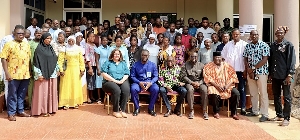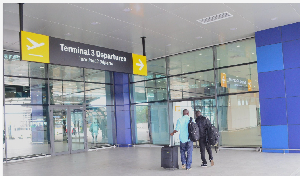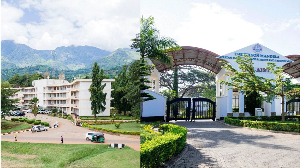In response to emerging challenges and the evolving landscape of terrorism threats in the West African sub-region, the United Nations Development Programme (UNDP), in partnership with the Ministry of National Security, with funding from the Governments of Australia and Germany, has initiated a comprehensive review of Ghana’s National Framework for Preventing and Countering Violent Extremism and Terrorism (NAFPCVET).
The National Framework, launched in 2019, was devised as a strategic blueprint to combat the spread of Violent Extremism and Terrorism (VET) within Ghana and the broader West African region. However, gaps identified during its implementation necessitated a thorough examination to enhance the nation's defense against potential terrorist activities.
Sukhrob Khoshmukhamedov, UNDP’s Deputy Resident Representative in Ghana, highlighted the urgency of the review process, considering the shifting global terrorism landscape.
"Addressing issues of inequality, marginalization, access to education and healthcare, promoting economic development in deprived communities, and fostering inter-communal dialogue are critical components of our counter-terrorism strategy," emphasized Khoshmukhamedov. "As UNDP, we stand ready to support Ghana in implementing these measures to address the underlying drivers of extremism."
Australia's Deputy High Commissioner affirmed their commitment to supporting Ghana's efforts in combating terrorism to foster strong and inclusive societies, resilient to extremist ideologies.
"We take great pride in supporting Ghana and its coastal states in their efforts to prevent and counter violent extremism through the Atlantic Corridor: Preventing Violent Extremism program. I extend my gratitude to the Ghanaian Government and UNDP for convening this crucial discussion."
Emmanuel Dadzie, the Technical Director at the Ministry of National Security, emphasized the significance of continuous cooperation among international partners in confronting the global threat of terrorism. He acknowledged the support of UNDP, Australia, and Germany in facilitating the review process, highlighting their commitment to enhancing security cooperation with Ghana.
"The review exercise marks a pivotal moment in shaping the path of change for our security architecture. It is imperative that we evaluate our successes and failures, identify emerging threats, and develop robust measures to safeguard the state against terrorism and violent extremism," stated Dadzie.
During the review, participants assessed the effectiveness of the NAFPCVET, focusing on its six guiding principles and four strategic pillars: Prevent, Pre-empt, Protect, and Respond. Key objectives included taking stock of existing knowledge on emerging threats, identifying integrated approaches, showcasing good practices, and suggesting ways to strengthen the prospective framework.
Khadijah Abdul Samed, a Communications and Gender Officer at Savannah Women Integrated Development Agency (SWIDA Ghana), shared her insights on the review process, stating, "I am truly impressed by the breadth of perspectives and innovative solutions shared by stakeholders during this review process. Before this exercise, my familiarity with the framework was limited, but engaging in these discussions has significantly deepened my understanding. I am particularly pleased with the proposed addition of a monitoring and evaluation component to the framework, as it introduces a cyclical process whereby insights gained can inform and enrich all four pillars of the framework."
The review process involved key stakeholders from government agencies, international partners, civil society organizations, and academia.
As Ghana remains the only coastal state along the Gulf of Guinea without a terrorist attack, stakeholders recognize the importance of proactive measures to maintain this status. The review process underscores the government's commitment to enhancing national security and preserving peace and stability in the region.
Press Releases of Friday, 22 March 2024
Source: United Nations Development Programme













